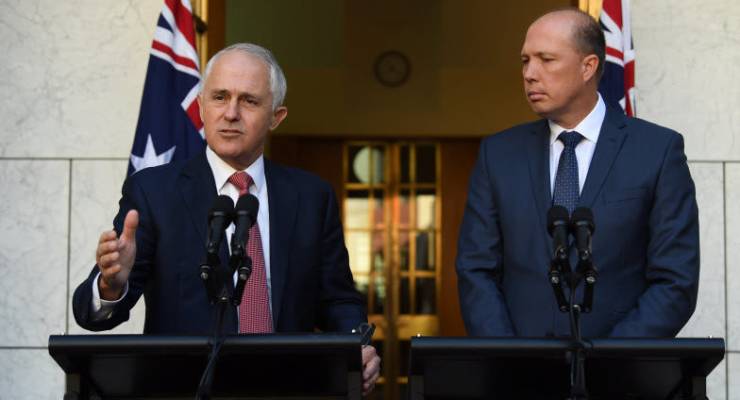
Peter Dutton was somehow the best applicant, the odd history behind the fissures at the National Tertiary Education Union and The Australian Financial Review makes a play for most profoundly awful take on the devastation in the US. Catch up with all the latest tips and murmurs from the Crikey bunker.
Peter Dutton’s Australia
He won’t like us saying it, but one of Malcolm Turnbull’s most lasting legacies may well be the inauguration of Peter Dutton’s Australia. The appointment of the hard-right Queenslander to the Home Affairs super-ministry has coincided with a noticeable extension of Australia’s police state.
Indeed, during an interview with Crikey editor-in-chief Peter Fray yesterday afternoon, one of the few answers Turnbull gave that wasn’t preceded by a thoughtful pause was the concession that he regretted the appointment, and that Dutton wasn’t really up to the job.
Pushed on why he’d picked Dutton in the first place, Turnbull argued there weren’t many alternatives. Which does not reflect glowingly on Turnbull’s former colleagues.
Fault lines
There’s an interesting twist to the uproar currently engulfing the National Tertiary Education Union (NTEU). For those not following the tortured soap opera, the NTEU leadership, anticipating a massacre in the sector on account of the gymnastics undertaken to exclude it from JobKeeper, took the bold stance of having its members take a 15% pay cut across the board in the hopes it would save jobs. Not an unusual move for a right-wing union.
Trouble is, the NTEU isn’t that — much of its current leadership, including President Alison Barnes, are grizzled veterans of the International Socialist Organisation (ISO), the so-called “Trots” who rose and fell in the 1990s and 2000s. Ultimately, their noble sacrifice was in vain — the unis rejected the deal.
How did these stalwarts stumble so badly? “They got captured by the sector” is one general rank-and-file comment. That may explain why the leadership is currently under siege from an insurgency in its Victorian branches, led by members of Socialist Alternative, the group that split — *cough* expelled *cough* — from the ISO in the 90s, after which ISO collapsed.
Big data comes after COVID
Facebook have started rolling out their COVID-19 mapping survey in Australia:

You’ll not be surprised that we at Crikey are a touch skeptical about this, although Facebook has claimed it will not have access to users’ health data, which will go straight to researchers at Carnegie Mellon University. Regardless, the situations in the UK and US — where Facebook’s mapping has already been rolled out — don’t exactly count as a ringing endorsement for its efficacy.
Wacko watch
Did you know that the president most responsible for America going up in flames right now isn’t Donald Trump but… Lyndon Johnson? At least according to today’s editorial from The Australian Financial Review.
Systemic racism isn’t a problem in the US, according to the AFR — indeed, the argument that “white-on-black police brutality sheds a larger light on how America remains a systemically racist country tainted by the stain of slavery” is actually a false narrative peddled by the “radical Black Lives Matter movement” (it being radical, of course, to suggest white police shouldn’t be able to publicly murder black men and women with impunity).
The real problem, the AFR continues, is that “the Great Society welfare programs of Lyndon Johnson had disproportionately destroyed the black family”. We’re sure the families of George Floyd and Breonna Taylor would agree that the Texan Democrat who has been dead for nearly 50 years is ultimately to blame — though we look forward to a future AFR thinkpiece on why it’s all Lincoln’s fault for freeing the slaves in the first place.
Trump watch
Still in the US, the man elected to guide the United States through a unique confluence of civil upheaval and public health catastrophe is on track to make nearly 25,000 false statements by the end of his first term according to The Washington Post.
The Post employs four full-time reporters whose only job is checking the president’s claims. And it’s getting harder:
The president’s speeches got longer, he tweeted more frequently and he gave more interviews to friendly right-wing outlets that rarely challenged him. Now, [the team] often lose nights and weekends to what they describe as ‘the depressing task of wading through the president’s forest of falsehoods’.








“‘… the president’s furball of falsehoods'”?
Once, again, this is a misrepresentation of the NTEU’s jobs protection framework. It did not set in place a 15% payout, rather it formalised some rather extreme circumstances where that might be taken to a vote. Get this right please Crikey, I have pointed this out previously
A general comment – I’m delighted to see a re-badged ‘Tips & Murmurs’ segment appearing more often. It was always my first-to-read in my daily Crikey of old. These rumours were very often be on the money days before they went mainstream.
Please continue the good work every day if possible. And perhaps give it a subhead more significant than 2 tiny red heads in a graphic.
Thanks… David
A general comment – I’m delighted to see a re-badged ‘Tips & Murmurs’ segment appearing more often. It was always my first-to-read in my daily Crikey of old. These rumours were very often be on the money days before they went mainstream.
Please continue the good work every day if possible. And perhaps give it a subhead more significant than 2 tiny red heads in a graphic.
Thanks… David
Michael Evans, Media Officer, NTEU: If your journalist had bothered to read our material at the end of the link, he would know that the proposed university jobs protection framework did NOT propose a 15% across the board wage cut, in fact nothing like that. Don’t mind the cheap shot, but at least get the facts part correct, or it’s just sloppy journalism.